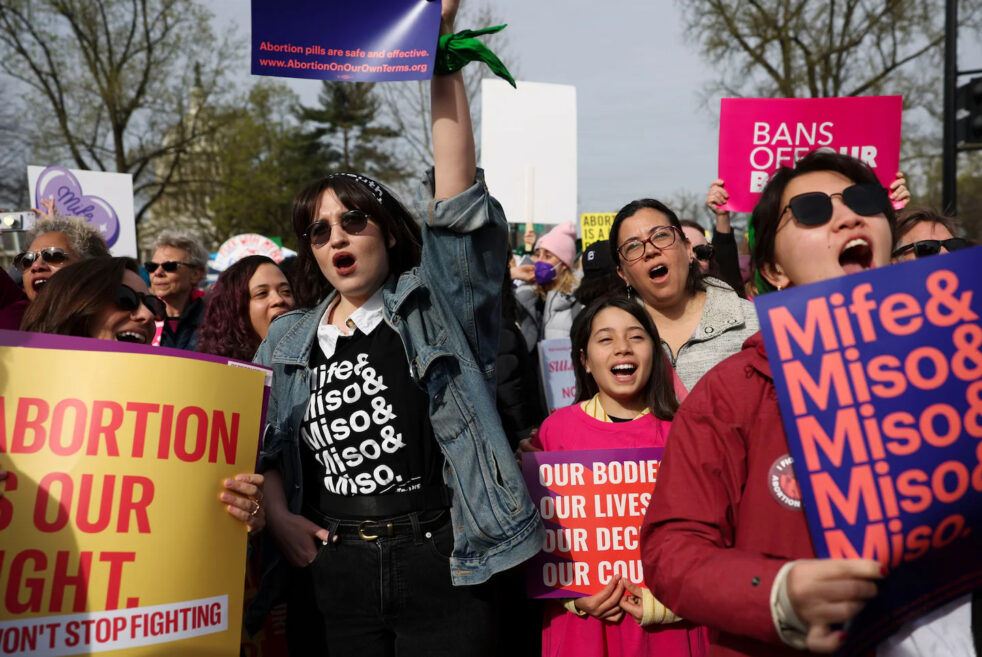Since the overturning of Roe v. Wade in June 2022, dialogue surrounding states’ rights, abortion access and reproductive freedoms have reached national notoriety. With the looming 2024 general election, conversations about potential abortion bans are a high priority on the ballot. Most recently, Florida’s Supreme Court ruled that abortion rights are not protected by the Florida constitution, and this ruling will result in a strict abortion ban in the state taking effect on May 1.
Specifically, the Florida ruling altered the existing ban on abortions past 15 weeks and decreased it to 6 weeks. While the new ban will go into effect in the next 30 days, an additional ruling mandates that in November, the abortion ban will be presented to Florida voters as Amendment 4 on the ballot. In order for both of the bans to be approved, 60% of voter approval is required for constitutional amendments.
Furthermore, a recent case brought before the Supreme Court of the United States seeks to limit the use of mifepristone, a “drug that blocks a hormone called progesterone that is needed for a pregnancy to continue. Mifepristone, when used together with another medicine called misoprostol, is used to end a pregnancy through 10 weeks gestation,” according to the Food and Drug Administration (FDA). This current regimen for medical termination of pregnancy using mifepristone is approved by the FDA and deemed safe when utilized as direction in adherence with the Mifepristone Risk Evaluation and Mitigation Strategy (MREMS) Program.
The plaintiff in the case is the Alliance for Hippocratic Medicine, and the organization’s lawyer, Erin Hawley, argued before the Supreme Court that mifepristone is dangerous. Hawley, the spouse of Missouri Sen. Josh Hawley, specifically cited that when mifepristone administration results in medical complications, doctors who do not agree with abortion are often put in a situation where they must decide between treating the expectant mother versus going against their morality. Additionally, Hawley argued that the abortion pill’s federal approval did not meet rigorous enough standards for considering side effects and health risks associated with mifepristone.
While it is unlikely that the Supreme Court will restrict access to mifepristone, the plaintiff’s opposition to FDA authority creates a unique environment for the justices to re-evaluate ruling changes set forth in 2016 and 2021 that expanded mifepristone access through mail, allowing it to be prescribed by medical personnel other than just physicians.
With abortion rights being a hot-button topic for the upcoming election, young voters are concerned about the potential limitations on abortion access, specifically through the restriction of an FDA approved pill like mifepristone.
James Nurhonen, fourth-year AE and PHYS, said “the overturning of Roe v. Wade opened the doors for many states to ban or severely limit access to abortion. In many cases, these were on the basis of beliefs on what is a life or religion. Everyone is entitled to their own beliefs on whether all life is precious, and if their religion says abortion is an evil, then they can believe it. However, not everyone in these states share the same belief; therefore, the government cannot make laws that force them to comply with someone else’s beliefs. They are protected by the First Amendment. The Supreme Court heard arguments over a pill that can be used for the abortion of early pregnancies. This pill was certified by the FDA and was allowed to be mailed. The plaintiffs are a bunch of doctors who don’t believe in abortion. This is probably the weakest argument possible and the result they are looking for is a nationwide ban. As a doctor, they can choose to not treat a patient and pass them along to another doctor. They are not being forced to treat these women. There is no challenge here.”
Nurhonen expressed his concern that while the Supreme Court will likely not restrict mifepristone access, there is the possibility of enforcing the Comstock Act of 1873, which would make mailing the abortion pill illegal.
“If the Supreme Court issues a ruling that blocks the mailing of this abortion pill, citing the Comstock Act, they would solidify the argument that the current court system is a failure and support for court stacking would rise. Court stacking is not a good idea. The Comstock Act is from a bygone era, an era when women couldn’t even vote. It banned the mailing of several ‘lewd’ items including contraceptives. But Congress amended the Comstock Act in 1971 that removed the restrictions on contraceptives. Therefore, the Comstock Act should have no relevance in this case. The conservative members of the Supreme Court are fishing for anything that could codify their beliefs — something the Constitution is vehemently against,” Nurhonen said.
For young voters like Nurhonen, the implications of a Supreme Court ruling supporting the restriction of mailing the abortion pill would result in a safe form of abortion being taken away from women, even in states where abortion is protected.
“The court is supposed to be impartial, making rulings regardless of faith or political affiliation, but this ruling could show the Supreme Court taking a more active role in policy shaping. This is something the constitution is supposed to be designed to avoid. The pill being scrutinized should stay legal. It is one of the few ways that is legal and relatively safe according to the FDA,” Nurhonen said.
He expressed fears common among young voters related to the proliferation of abortion bans and how it would affect them.
“If this pill is taken out of circulation, a lot more unsafe abortions will take place, and many of these doctors that think they are being forced to participate in an abortion, might actually be more consistently than if the pill was allowed to remain in circulation. The blocking of this medication would be a great injustice,” Nurhonen said.
